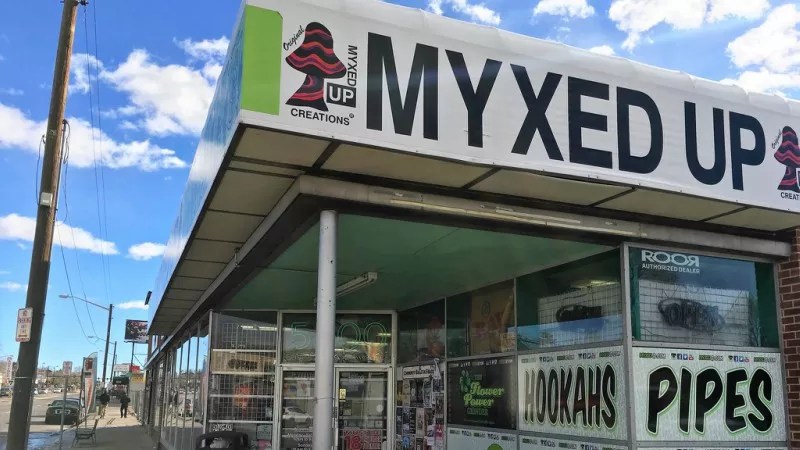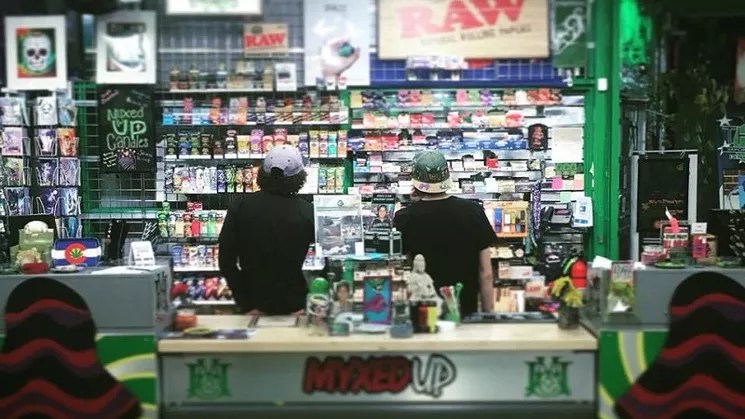

Audio By Carbonatix
Around noon on November 20, 2017, mere hours after Denver Environmental Health announced a ban on the sale of kratom for human consumption in the city, DEH representatives stormed into the 5800 East Colfax Avenue branch of Myxed Up Creations, which had been selling the popular herbal pain reliever, and ordered stock valued in the thousands of dollars to be destroyed on the spot. Michael Gross, the shop’s attorney, who likened the action to “a commando raid,” managed to prevent the supply from being trashed, and now the Denver agency’s own board is allowing the kratom in question to be transferred to Myxed Up’s sister stores outside the city limits after criticizing the way the matter was handled. But as many as fourteen other businesses in Denver weren’t so lucky.
At the Denver Board of Environmental Health’s February 8 hearing, Gross says, officials referenced “fifteen establishments in Denver that were selling kratom. They did inspections on the 20th and seized and condemned kratom at several of them. Myxed Up is the only one that appealed, so the other establishments had their kratom destroyed.”
He adds that the board called what went down “a flawed process.”
As we’ve reported, kratom has not been approved by the U.S. Food and Drug Administration, and in August 2016, the federal Drug Enforcement Administration took steps to reclassify it as a Schedule I narcotic before reversing course early in 2017. The change in approach was undoubtedly influenced by public backlash epitomized by a White House petition decrying the DEA proposal that attracted more than 140,000 signatures and a letter sent to acting DEA head Chuck Rosenberg that was signed by a group of 51 U.S. senators and representatives.
Nonetheless, the feds have continued to view kratom consumption as dangerous, attributing fifteen deaths between 2014 and 2016 to its use – though fourteen of those people had other drugs or illegal substances in their system. Last November 14, the U.S. Food and Drug Administration issued a public-health advisory warning individuals not to consume kratom, and six days later, on the morning of the 20th, Denver Environmental Health took things a step further.
The agency didn’t prohibit all sales of kratom, but retailers that wish to peddle it for non-consumptive purposes were told that they must affix a consumer advisory “in large font…easily readable to all purchasers” that states, “This product is not intended for human consumption. Consuming kratom products may pose a risk, including death, to consumers and has addictive potential. Increased risk of injury or death may be posed by consuming with alcohol and other drugs.” Moreover, DEH forbade sellers to give consumers advice about dosage or consumption.

Inside Myxed Up Creation’s Denver store.
At that point, Myxed Up entered the story. Gross told us that DEH reps arrived at the Colfax store shortly after the new rules were made public and began searching for consumable kratom. Investigators quickly targeted some capsules on sale by the front counter, as well as a supply in the warehouse area spotted by an inspector during what he said was a visit to the restroom.
The material – which Gross originally estimated at being worth about $3,000, but whose actual value was pegged at $4,050 in a subsequent inventory – was seized, and heath department personnel wanted to pour bleach over it, rendering it useless. But Myxed Up management refused to go along with this plan, prompting the DEH crew to issue a cease-and-desist order in regard to sales that mandated the kratom’s destruction within two days.
Gross managed to put a hold on this dictate by filing an appeal with the board, and while he was originally told he would only have fifteen minutes to make a presentation on February 8 about why he felt what happened constituted an unfair governmental overreach, he wound up with around an hour to state his case – a substantial increase over the initial pledge, yet less than the estimated eighty minutes the city was given. Division director Danika Lee was among those who testified on behalf of Denver, and Gross says four city attorneys – two advising the board, another two representing the department – were on hand.
In the end, the boardmembers weren’t persuaded that the kratom deserved immediate destruction.
“They thought more notice should have been given to merchants,” Gross notes. He adds that the DEH press release announcing the consumable kratom ban “talked about sale or distribution, but it didn’t talk about mere possession being illegal. And the board indicated that part of the department’s mission is education as well as enforcement – and they felt there should have been more education and a little less condemnation of a lawful product.”
Gross feels this last point is especially important. He says that had the kratom capsules been emptied, their contents would still be legal in Denver as long as the herb wasn’t being sold for human consumption. Moreover, no consumption restrictions exist in Aurora, Colorado Springs or Pueblo, where Myxed Up also has stores.
The latter can now sell the kratom in question in capsule or tincture form, as the Denver affiliate had been able to do prior to the ban. But in Denver, Myxed Up will abide by the current regulations even if its owners disagree with characterizing kratom as dangerous.
“Myxed Up certainly acknowledges the power and the duty of Denver to protect the public health,” Gross emphasizes. “We may differ on the tactics, but the owners have been a part of the community for a long time and have fully cooperated with labeling and so on. It got heated at moments during the hearing, but they gave us a hearing and really listened to our arguments, and I was impressed. And overall, the board didn’t think it was a fair process.”